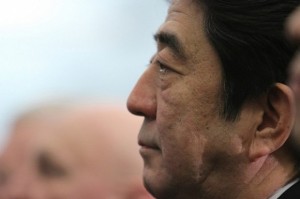Japan accelerates plan to expand its military capability
Saturday, May 17th, 2014 8:23:12 by Jamshed Sindhu
When Japan lost the Second World War, the United States imposed a pacifist constitution (1947), according to which Tokyo forever renounced war and the role of its armed forces was restricted to self-defense. Prime Minister Shinzo Abe, believes that the international context has changed dramatically since then and that the country should change this to take greater responsibility for their own defense and contribute more to international peace missions and military cooperation.
Abe has called on Thursday to review the legal limits on the ability of the Army, in fact, called Japan Self-Defense Forces (JSDF) – to fight abroad, and implement a fundamental change in Japanese security policy for decades constrained by its pacifist constitution.
Abe, who became the head of government in December 2012 in front of the Liberal Democratic Party (LDP), wants a stronger army to enable it to face the new geopolitical landscape, and in particular the maritime territorial dispute with China and continuing nuclear threat from North Korea.
The prime minister on Thursday formally received the report of a panel of experts appointed by the Government, urging reinterpret the constitution to allow the use of military force in defense of other countries. ” We must consider whether the current interpretation of the Constitution is sufficient to protect people and their peaceful lives,” he said in a televised news conference. “We can not protect our peaceful lives simply repeating that we are a peaceful country. Our peaceful lives may have suddenly faced a crisis. Can anyone say that this will not happen? “, said the Prime Minister. In a gesture to those voters who fear that Tokyo return to militarism and Asian countries that suffered Japanese imperialism, has insisted that Japan will never be ” a country that makes war.”
Abe wants to reinterpret Article 9 of the Constitution, by which Tokyo renounced war as a sovereign right to resolve any dispute, and so far been prevented from exercising the right of collective defense called; ie, the deployment of troops to help allies are attacked.
If the changes go ahead, Japan could come to the aid of the United States or another country, even if he ‘s not target of the attack. Tokyo has gradually softened with age restrictions of Article 9 to allow the deployment of troops overseas in special circumstances, but not to use their weapons against each other.
The prime minister said that no country can defend itself, and that the current interpretation of the Constitution, the Japanese troops could not use force to rescue Japanese citizens fleeing a conflict zone aboard a U.S. ship, if this were attacked. However, he has insisted that Japan never sent troops abroad to start a conflict.
A modification of the current limitations would be welcomed by the United States, with which Tokyo has a security treaty by which Washington is obligated to defend its ally if needed. United States, which faces budgetary pressures in the Army, wants Japan to assume a greater role in their own defense. Washington has about 50,000 troops in the Asian country.
Abe, however, has said the Government will not follow a recommendation of his advisers for Japan to lift the ban on participation in collective security operations led by the UN, in which countries come together to push an aggressor against a country.
It is unclear how far Abe can reach in his plans. Some opponents say the changes would undermine the clause of the Constitution by which the country renounces war, and that even if small, could open the door to more drastic movements. In addition, voters are divided and there are fears in the Liberal Democratic Party on the impact that the decision may have on the local elections this year and next.
Short URL: https://www.newspakistan.pk/?p=44117

















